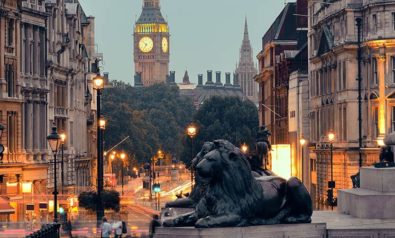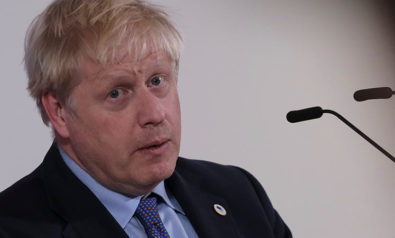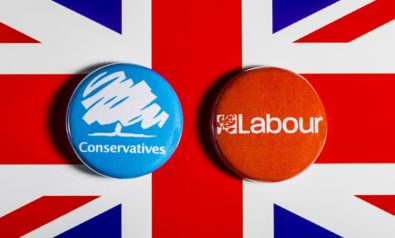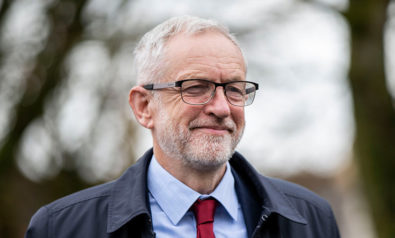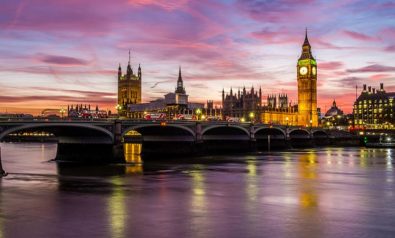The vast majority of voters got it right. They knew that Thursday’s election could only produce a meaningless result, and they acted in consequence. Although unambiguous, the result answers no questions, but opens up new ones. To anyone with an understanding of historical processes, the idea that this election could in any way help define the nation’s future made no sense. After such a long wait to solve an obviously unsolvable problem, the people opted for the one uncertain choice that might point toward a resolution when all other choices appeared to lead nowhere. History now awaits the next stage in the nation’s agonizingly uncertain future.
Whether we apply these observations to Thursday’s election in Algeria or the United Kingdom, the previous paragraph accurately describes a wider moment of history that now concerns every democracy across the globe. Both of Thursday’s elections underline, in contrasting ways, the unfortunately growing meaninglessness of the ritual of democratic elections. In Algeria, a majority of the people abstained from voting. In the UK a near majority (45%) of the people abstained from any form of critical thinking, but voted anyway.
This time, 60% of Algerians qualified electors voted not to vote. Their message was clear. After decades of arbitrary rule, and nearly a year of repeated peaceful protests, they are still waiting for democracy. Not just an election, but democracy. On the same day, the UK went through a similar ritual and, in a very different way, made a similar point. The British, poised between the comically arbitrary attempt at direct democracy — the 2016 EU referendum — and the constantly exasperating and inconclusive exercise of parliamentary democracy under Prime Minister Theresa May, the public has woken up from its latest election and is left, more than ever before, wondering how democracy works and what it is even useful for.
Renunciation of Critical Thinking
While it might sound severe to claim that British voters massively abandoned critical thinking, the easily verifiable fact that the sitting prime minister who led his party to a resounding victory is someone who lives and breathes by slogans and easily detectable lies, points to a high level of either gullibility or misplaced confidence among the voters. Their capacity to place their confidence in a new form of political boldness, with brutally strong ideas but no sense of their consequences, echoes the experience of the United States for the past three years.
It literally entails the renunciation of critical thinking, or even the notion of accountability. It relies on the hope that decisions whose consequences are too complicated to think about will be made without further ado by a resolute leader, piercing the abscess of prolonged uncertainty. And while it might sound like trivial carping to call inconsequential what many have identified a “a historic election,” it’s important to remember that “inconsequential” can have two meanings. The first, “devoid of any kind of consequence,” obviously does not apply.
There will definitely be dramatic consequences stemming from Boris Johnson’s victory. Nicola Sturgeon, leader of the Scottish National Party (SNP) has made it clear that Scotland may be on the verge of a prolonged struggle — possibly an internal cold war — with the nation of England that has decided to secede from the union (with Europe) that Scotland has voted to belong to. At the same time, Johnson appears ready to put Northern Ireland in limbo, unified economically with Europe and politically with a post-Brexit tenuously-united kingdom.
The second meaning of “inconsequential” — “incapable of resolving uncertainty” — does seem to apply, unless by some miraculous feat of persuasion Boris Johnson manages to unite, not just the kingdoms that make up the UK, but also the parties, the businesses and the nebulous middle class/working class who still have no clear idea of what It means to “leave,” even if that is their clear preference.
In his victory speech, Johnson was adamant. Yes, leave they will. Brexit will be done. The refrain has practically turned into an echo of “Thy will be done.” Whether that will is the deity’s, the people’s or Johnson’s doesn’t seem to matter since — for all the charming humility of the prime minister’s joyous victory speech (once all the smashing was done) — Johnson appears to see all three as total convergent.
Democracy’s Romance with Liars
Once upon a time, in modern civilization there existed a grand idea that wasn’t always easy to apply but always worth trying. Innovative political thinkers gave it the label — “democracy.” After surveying the damage from numerous recent elections, those same thinkers may have to admit that today the label still exists, but the grand idea seems to have been swallowed up in a whirlwind of chaotic electoral rituals and processes.
For the past three years, the British have started asking themselves some serious questions. Was the 2016 referendum an election, as Johnson and even Theresa May have assiduously asserted? They claimed that by that vote the electorate had validated a program for government summarized in a single word, “leave”? Now, with slightly more reason, Johnson seems to be proclaiming that this week’s election was a referendum. He made it clear that there will be no second referendum precisely because that is the meaning he attributes to this vote.
Just as, twice in less than 20 years, the United States has achieved an apocalyptic confusion at the core of its own democracy by denying the election of the leader the majority voted for — thanks to the antiquated and unrepresentative relic called the Electoral College — the British parliamentary system has evolved to the point of turning democracy into a highly uncertain system for founding and buttressing a government’s authority. Elections have become a vacuous popularity contest in which policies are now compressed into slogans and victory promised to the personality that best succeeds in embodying a slogan.
Until recently, the idea of democracy prevalent in the West contained two fundamental premises that most people accepted and adhered to. The first affirmed that it was a system designed to allow people to compose and orientate their governments through elections in which motivated citizens had the choice of standing as representatives of their community and the right, if not the civic duty, to vote for the brave citizens who made that choice. The second assumed that people who ran for office could be trusted with the truth and that they could be expected to demand the truth to ensure and sanction capable government.
This formulation of the ideal failed to anticipate the creation of a political class. It supposed that those who were elected retained their identity as citizens while adding to that basic political identity a specific mission of representation through their participation in the governance of the state. Abraham Lincoln called it government of the people, by the people and for the people.
The structure of the modern state in democracies has undermined that ideal to the extent that it has fostered the creation of a political elite closely connected with numerous interests that escape any form of democratic control. It means that the people are on one side, the political class in the middle, and hidden on the other side is an oligarchic class with which the political class is invited (but not obliged) to identify.
Lucid observers will notice degrees of identification with the oligarchy between different politicians. Personalities such as Jeremy Corbyn and Bernie Sanders seem closer to the original ideal to the extent that they appear to be less attracted to identify with the oligarchic class. There can be little doubt about the parties either a Johnson or a Trump are ready to identify with.
The modern economy has found a myriad of ways of undermining the second premise of democracy: the importance and the stability of truth. In a culture that has been conditioned by the ideology of capitalism in which every individual pursues his or her own self-interest, persuasion — originally straddling logic and rhetoric — becomes a primary rather than secondary function of transactional behavior. The exercise of persuasion then fatally evolves toward the simplicity of the slogan.
Boris Johnson’s victory speech perfectly illustrates the success of this subversion of democracy. At various points, he prompted his audience to chant his electoral slogans and concluded by wittily forcing a repetition of his all-purpose, single dominant slogan: “Get Brexit done.”
The Walrus Has Defeated the Carpenter
In the run up to the election, this author pointed to the uncanny political prescience of 19th-century author of “Alice in Wonderland.” In his delightfully absurd poem, “The Walrus and the Carpenter,” whether consciously or not, Lewis Carroll devised his own oblique way of describing the foreign policy of the British Empire. He also seized on the occasion to compare two stereotypes of British politicians.
Were he alive today, Carroll would have recognized in Boris Johnson as conforming to his type represented by the bombastic Walrus. Johnson even walks like a lumbering Walrus. Evoking the future glory of an independent Britain that in one sweeping motion has severed its ties to the continent and is on course to provide a new model of leadership for the world, Johnson reminds us of the Walrus’s grand vision of sweeping away all the sand from the beach, even if it meant employing seven maids with seven mops.
With Johnson camped in the role of the Walrus, Jeremy Corbyn correspondingly slipped into the part of the Carpenter, who, having heard the Walrus’s project to clear the sand, curtly expressed his doubt, about both “remain” and “leave.” The Carpenter preferred focusing on pragmatic matters such as making sure there were enough slices of bread.
The Walrus excelled at lying and hypocritically declaring his sympathy even with the oyster he was feasting on. In 21st-century democracies — whether it’s the US, the UK, India, Brazil or Hungary — those who lie the most and the hardest tend to win elections. It’s the age of the Walrus. Johnson was a far better liar than any other candidate. He made Brexit Party leader Nigel Farage seem too hopelessly sincere and straightforward. (Farage has since declared his commitment to working for an even more powerful liar: Donald Trump).
In contrast with the ever-serious and visibly vindictive Trump, Johnson possesses a wonderfully British style of lying. Trump’s style is perfectly adapted to US culture but is clearly out of place in Britain, where he is universally despised. Conversely, Americans would not buy into Johnson’s style of lying the way they have bought into Trump’s.
Americans can dare to call Johnson’s demeanor a “silly style,” not nearly assertive and businesslike enough for American tastes. The Brits prefer to call Johnson’s style “eccentric” and “shambolic,” even “clownish,” which — in the nation that gave the world Benny Hill, “The Goon Show” and “Monty Python” — have long been deemed not just acceptable but even endearing as the attributes of a benevolent ruling class that has a capacity for being entertaining. Observant commentators have noticed how carefully Johnson cultivates this style — it’s what permits him to lie as repetitively and brazenly as he does. People relate his lies to the forgivable shortcomings of an erudite bumbler.
The Power of Lies
Sifting through the statistics of the election, political analyst Will Jennings points out that “education is a strong predictor of changes in the Conservative and Labour vote.” He calls it “the new dividing line of British politics.” The trend in this election showed a correlation between the percentage of graduates in any constituency and votes for or against the Tories. It now appears that the higher the level of education, the more likely it is that voters will be critical of simplistic reasoning and slogan-based policymaking.
Johnson may have studied Trump’s success in the US and adapted his style and the degree of his mendacity to British demographics. Trump had his worst results along the Atlantic and Pacific seaboards where education levels were higher and where the prestige of education remained a significant feature of the local culture.
But he eked out his victory, not only in rural areas where education levels are traditionally lower, but especially in the declining industrial areas where many people can no longer afford education. These less educated populations tend to be more responsive to slogans and populist rhetoric. The gutting of British industry made conditions more favorable to politicians capable of reducing their thinking to the level of oft-repeated slogans.
The current success of outright liars represents a major threat not just to democracy but to the future of even the idea of democracy. Richard Nixon resigned and Bill Clinton was impeached not over their irresponsible acts or eventual crimes, but over the fact that they lied. British politicians have traditionally feared being caught out for lying and for centuries have cultivated the art of rhetorically hedging their rhetoric to disguise their lies. Hiding and distorting the truth have always been key components of the art of political rhetoric, but outright lying has in the past been treated as shameful and disqualifying.
As Bob Dylan famously sang, though not to make the same point, “the times they are a-changin’.” Lying has now achieved the prestigious status of an effective short-term strategy. But its long-term consequences are likely to be disastrous for the survival of democracy.
Rule by Liars
Just as murder led Macbeth to the throne, lying has led Johnson to obtaining a solid majority in Parliament. And just as Macbeth underestimated the struggle with his own conscience, Johnson may well have underestimated the likely blow-back from his lies, to say nothing of the obvious complications of Brexit and a cold war with Scotland.
The conquest of power through the force of lies creates more than ideological division among the population. As this general election demonstrates, it has started pitting the more educated against the less educated. This may be a part of a longer-term trend of the dumbing-down of education itself, whose value has increasingly been focused, throughout the Western world, not on its content or its contribution to national or local culture, but to its vocational end — the prospect of getting a job.
But the damage goes further. It implicitly divides the population into those who accept lies and those who are offended by lies. Even though the latter may be a minority, a regime that thrives on lies sends the sinister message that critical thinking will be suspect because it leads to useless complications and constitutes an obstacle to social harmony. It sets the stage for ever more arbitrary styles of governance.
At a deeper level, rule by liars repositions the question of trust that has always been essential to democracy: It uncouples trust from the criterion of truth. Instead the population places its trust, as Max Weber theorized more than a century ago, in the power and determination of a charismatic personality. However shambolic and eccentric Boris Johnson may seem, and however spontaneous Trump’s form of speaking without thinking appears to be, their avid embrace of lies means that the bond of trust on which democracy relies risks being irreparably broken.
The very nearly simultaneous release by the The Washington Post of the Afghanistan Papers — revealing how three administrations (Bush, Obama and Trump) have consistently lied about the costly and never-ending wars in the Middle East — provides another indication of the decline of democratic values and the eventual disappearance of the conditions in which democratic values can exist. The publication of 18 years of lies exposed for the first time to the light of day, available for anyone to read has, perhaps not surprisingly, produced no significant echo in the popular media — and this as the lies continue to this day.
The voting populations of our evolved democracies have apparently learned to accept, and even expect, that their governments lie. Worse, they seem to believe that lying is such a common feature of a government’s activity that without it nothing would work.
On Thursday a majority of Algerians refused to vote because their government lies to them and refuses to listen. That same Thursday, 45% of British voters voted to offer the reins of government to a man they unquestionably know is perfectly comfortable lying to them over and over again.
The views expressed in this article are the author’s own and do not necessarily reflect Fair Observer’s editorial policy.
Support Fair Observer
We rely on your support for our independence, diversity and quality.
For more than 10 years, Fair Observer has been free, fair and independent. No billionaire owns us, no advertisers control us. We are a reader-supported nonprofit. Unlike many other publications, we keep our content free for readers regardless of where they live or whether they can afford to pay. We have no paywalls and no ads.
In the post-truth era of fake news, echo chambers and filter bubbles, we publish a plurality of perspectives from around the world. Anyone can publish with us, but everyone goes through a rigorous editorial process. So, you get fact-checked, well-reasoned content instead of noise.
We publish 2,500+ voices from 90+ countries. We also conduct education and training programs
on subjects ranging from digital media and journalism to writing and critical thinking. This
doesn’t come cheap. Servers, editors, trainers and web developers cost
money.
Please consider supporting us on a regular basis as a recurring donor or a
sustaining member.
Will you support FO’s journalism?
We rely on your support for our independence, diversity and quality.



